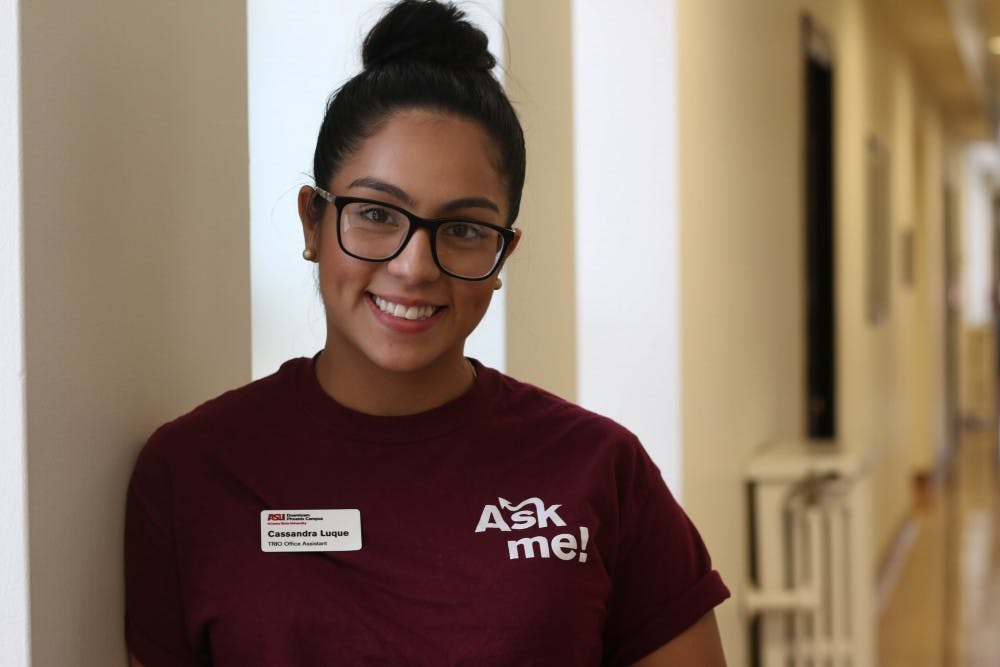Cassandra Luque, a sophomore studying criminology and criminal justice, is a young Chicana who seeks to overcome, what she has called, the inevitable reality she is destined to face as a minority within American society.
Luque possesses a tremendous amount of pride for her community in Maryvale, a subsection of Phoenix and the roots she derives from Sinaloa, Mexico.
Some first-generation college students said they face the difficulty of not being understood by the ASU community and even their parents, who do not truly comprehend the amount of effort it takes to be successful in college as they have little-to-no exposure to the curriculum or college process.
Luque's parents, born and raised in Sinaloa, Mexico did not have the opportunity to pursue their education which is why she hopes to make her parents' work worthwhile.
She believes in “breaking the cycle” and said she is fulfilling her obligation and personal ambition of aspiring to be the first in her family to not only attend a university, but to graduate.
When Luque initially arrived to ASU as a freshman last year, she said she felt extremely intimidated as she looked around the downtown Phoenix campus. She noticed there were hardly any Chicanx/Latinx students or staff in comparison to her Maryvale community that consists of predominantly Hispanics.
Despite feeling excluded because of her low-income, first-generation student status, Luque said she believes she is more than capable of obtaining success and aims to prove to society that success for a minority, specifically for a Chicana, is possible.
“I need to follow what I know is right instead of letting others’ expectations get to me," Luque said. "I’m here for a reason. I gotta show them what I got, and I wanna make everyone proud.”
There are students within the ASU community who continue to face the stress and pressure of having to endure college alone with a lack of academic and financial support from their families.
Luque emphasizes the tremendous amount of support she has received from TRIO Student Support Services, a program that provides academic assistance and support to low-income, first-generation and students with disabilities.
In regards to her fellow TRIO students, she said, “We’re all going to push each other to become better because we know the struggle. We have big dreams and we’re going to encourage one another until we reach those goals, no matter what.”
Luque said she believes minorities who identify as Chicanx/Latinx/Hispanic must recognize the crucial role they possess and allow that awareness to encourage them to be successful “not just because we’re minorities, but because we’re students too, who came here for the same reason.”
Luque said she believes minorities should be viewed on the same standards as privileged students as they all possess the same amount of potential.
"They need to stop underestimating us because we don’t have the money or because we didn't come from an educated family," she said. "We all have to work for what we want. Sure, it’s easier for some than others, but I’m pretty sure I’m capable of success just as much as a student who comes from a wealthy family.”
Similarly, Michelle Ailport, a freshman majoring in journalism and mass communication, is a 2018 Coca-Cola Scholar because of her commitment to education and community engagement as well as her persistence in striving towards success.
"I’ve had to take advantage of nearly every opportunity that has come my way to support my family or learn something new," she said. "I’ve struggled to get where I am today."
Despite the setbacks that arose throughout her high school career, such as her mother becoming diagnosed with cancer, Ailport said, "I knew right then that the only way I could succeed after going through adversity was by paving my own way, especially as a low-income first generation student."
Ailport said she understands the significance of pursuing a higher education as she is on the College Board Youth Advisory Council.
"I am a big proponent of making higher education accessible to all students, regardless of their background," she said.
Matthew Sandoval, a faculty fellow at Barrett, The Honors College, stresses the importance of having first-generation students actively present and engaged within the University.
“Most educators I know want an extremely diverse classroom because it gives the students much more to talk about," Sandoval said. "It allows for so many diverse points of view to circulate within a discussion.”
As a first-generation college student himself, Sandoval says he understands the crucial role first-generation college students possess and the immense amount of pressure they face.
“First-generation students open other students' eyes to their own privilege,” Sandoval said.
He believes it is essential that more first generation students should be present within educational institutions as it promotes diversity and “immediately forces students of privilege to question their assumptions regarding first-gen students.”
Sandoval said students who come from educated families have the privilege of not having to feel distant from their family.
"There’s something about being a first-generation student that almost makes you feel alienated from your family," he said. "It’s a very real feeling to feel like you’ve left them behind.”
Sandoval said it ultimately comes back to the notion that these students are trying to assimilate within the University while simultaneously seeking to remain true to their roots.
“Chicanx/Latinx students especially have an obligation to continue to educate those who can’t be here. We’re here because we’re here for those who aren’t here," he said. "It’s all about representing our community and those we have inevitably left behind.”
Reach the reporter at ifrancor@asu.edu or follow @ifrancor on Twitter.
Like The State Press on Facebook and follow @statepress on Twitter.




